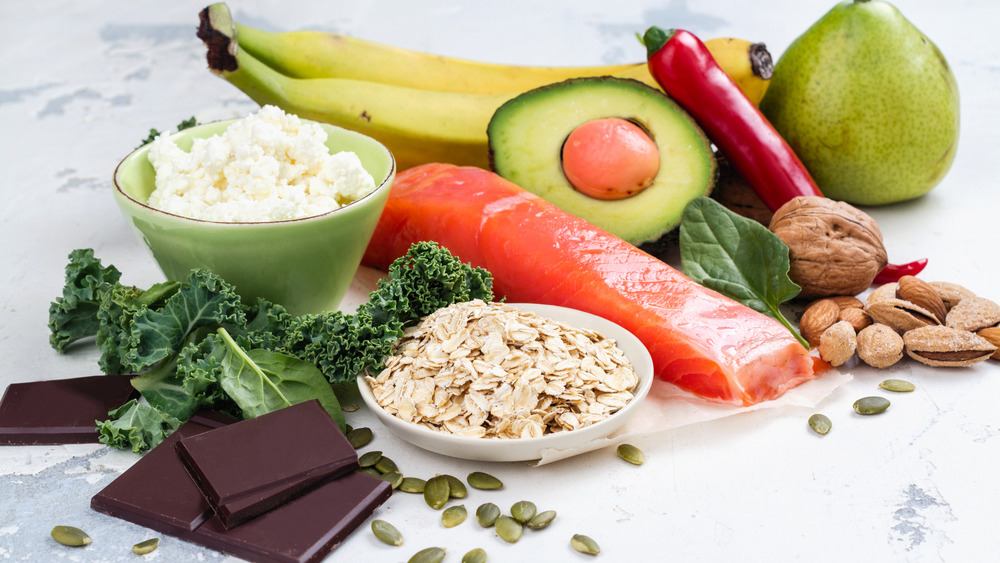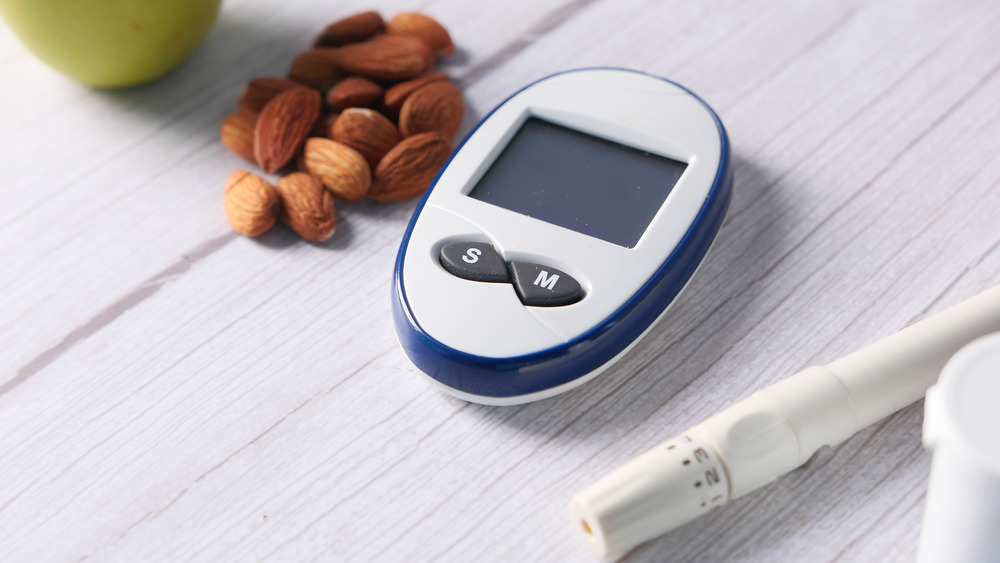Why Your Body Won't Be The Same After The DASH Diet
The DASH diet does not require any special foods or intense planning, according to the National Heart, Lung, and Blood Institute (NHLBI). If anything, it provides you with nutritional goals and tools to help you plan daily and weekly meals. The diet recommends eating fruits, vegetables, whole grains, dairy (fat free or low fat), poultry, fish, beans, nuts, and vegetable oils.
The diet also recommends limiting saturated foods, sugary beverages, alcohol, and sweets (via Medline Plus). It encourages reducing sodium and increasing your intake of potassium, magnesium, and calcium. Additionally, it calls for eating a variety of healthy foods and getting a balance of nutrients, while paying attention to portion sizes (via NHLBI).
The DASH diet extends beyond food, too, as it recommends exercising at least 30 minutes per day for a total of two hours and 30 minutes per week. To prevent weight gain, that recommendation goes up to 60 minutes daily. According to Medline Plus, the DASH diet has a number of health benefits. In more ways than one, your body won't be the same after embarking on the DASH diet.
The DASH diet was designed to regulate blood pressure
According to the American Heart Association, following a heart-healthy diet can help you to manage high blood pressure and reduce your risk for complications of high blood pressure, including heart attack. The American Heart Association recommends the DASH diet — or DASH eating plan as they call it — as a proven way to manage blood pressure. This makes a lot of sense once you consider what DASH stands for: Dietary Approaches to Stop Hypertension.
A study analyzed the effects of three different diets, all of which included 3,000 milligrams of sodium daily, on adults with and without hypertension (via National Heart, Lung, and Blood Institute). The diets were the typical American diet, the typical American diet with additional fruits and vegetables, and the DASH diet. Here, researchers provided all the foods and beverages to the study participants over an eight-week period.
As early as two weeks in, the study participants who added fruits and vegetables to the typical American diet had much lower blood pressure than those who had followed the typical American diet alone. The participants who followed the DASH diet had the most improvements in blood pressure. Follow-ups also found the DASH diet had improved LDL cholesterol (aka "bad" cholesterol) levels. Both high LDL and high blood pressure are considered risk factors for heart disease.
The DASH diet can help you lose weight
The DASH diet might help you to lose weight. And according to the National Heart, Lung, and Blood Institute (NHLBI), you can experience weight loss on this diet by reducing your calories slowly.
A 2016 review and meta-analysis of randomized controlled clinical trials reviewed the effect of the DASH diet on body weight and body composition in adults. In the 13 articles that met certain criteria, researchers found low-calorie DASH diets could lead to more weight loss than other diets. Additionally, they determined people who were considered overweight or obese might have the greatest weight loss from this diet.
The DASH diet recommends eating smaller portions throughout your day, and eating less meat and more fruits, vegetables, and whole grains (via NHLBI). It encourages choosing healthier snacks, like fruits, over sugary sweets and junk foods. All of these recommendations are helpful to weight loss. The DASH diet also offers specific information about caloric needs for men and women, as well as information regarding food servings (via NHLBI). In other words, it doesn't just tell you what not to do, it also educates you on healthy eating.
The DASH diet can help you keep your cholesterol in check
The DASH diet may be effective for managing both low-density lipoprotein (LDL) and high-density lipoprotein (HDL) cholesterol. LDL is considered "bad" cholesterol because it causes a fatty buildup in the arteries, according to the American Heart Association. HDL, or "good" cholesterol, is considered healthy because it can protect against heart attacks or strokes. High triglycerides (a common fat in the body) along with bad and good cholesterol can lead to fatty buildup in the artery walls, which increases the risk for heart attack and stroke.
A study reported in 2016 in The American Journal of Clinical Nutrition compared three diets: a control diet, a standard DASH diet, and a higher-fat, lower-carbohydrate version of the DASH diet. Each study participant tried all three diets, with each diet observed for three weeks, separated by two-week breaks. After the participants finished all three diet intervals, researchers found the higher-fat, low-carb DASH diet led to significantly reduced triglycerides and also reduced bad cholesterol. On the other hand, the standard DASH diet significantly reduced HDL and LDL cholesterol. Researchers concluded that both types of the DASH diet could help regulate cholesterol levels.
The DASH diet will regulate your blood sugar levels and reduce your risk for type 2 diabetes
The DASH diet can reduce your risk for type 2 diabetes and regulate blood sugar levels. Diabetes type 2 is generally an adult-onset condition in which your body resists insulin or doesn't produce enough insulin to maintain normal blood sugar levels. The Cleveland Clinic considers the DASH diet one of the best diets for managing diabetes. This because it is rich in fruits, vegetables, and grains and low in fats, sugars, and sodium.
A 2011 study in the journal Diabetes Care evaluated the DASH diet in people with type 2 diabetes. Here, researchers found the DASH plan improved fasting blood sugar levels by up to 29 percent. Researchers also found the DASH diet had beneficial effects on cardiometabolic risks, including heart disease and stroke. A second meta-analysis of prospective cohort studies published in 2014 in the journal Endocrine found the DASH diet was also linked to a 20 percent reduced risk for type 2 diabetes.
The DASH diet can keep you from becoming insulin resistant
The DASH diet has been found to improve insulin resistance. Insulin resistance occurs when cells in the muscles, fat, and liver don't respond very well to insulin and then can't use blood sugar for energy, as the National Institute of Diabetes and Digestive and Kidney Diseases explained. To make up for this response, the pancreas makes more insulin, leading to a buildup of blood sugar.
A 2013 article in the journal Current Hypertension Reports reviewed independent and combined effects of the DASH diet on weight loss plus exercise on blood pressure and insulin sensitivity. The reviewers found "significant improvements" in insulin sensitivity when the DASH diet was implemented with exercise and weight loss.
A second study —this one published in 2017 in the BMJ Open Diabetes Research & Care — examined the connection between diet, diabetes status, and insulin resistance in Hispanic and Latino adults. Researchers found a strong connection in controlled diabetes for participants eating the DASH diet but not taking glucose altering medicines.
The DASH diet might help you ward off some types of cancer
There has been evidence suggesting people who follow the DASH diet might have a lower risk for some types of cancer. This connection may be related to the "high content of fiber, nutrients, vitamins, mineral, and antioxidant capacity," a 2015 review in the Journal of Research in Medical Sciences explained.
In this review, researchers found a connection between this diet and reduced risk for bladder, gastric, and colorectal cancers. The researchers concluded that exact connections between DASH and certain cancers need to be studied more to determine specific responses amongst foods and nutrients and how they might contribute to a reduced risk for these types of cancers.
A 2020 study published in the journal BMC Cancer also looked at the DASH diet and its connection to breast cancer in Iranian women. Researchers found the greatest adherence to the DASH diet was associated with decreased breast cancer risk.
The DASH diet may lower your risk for metabolic syndrome
Metabolic syndrome is a "cluster of conditions" that increase the risk for diabetes type 2, heart disease, and stroke, according to the Mayo Clinic. These conditions include obesity, high blood pressure, high blood sugar, abnormal cholesterol or triglyceride levels, and excess fat around the belly. However, studies have shown a lowered risk for metabolic syndrome in people who utilize the DASH diet. For example, one 2014 study in the European Journal of Nutrition found the risk could be reduced by up to 81 percent.
A 2020 review in the journal Nutrients looked at specific dietary changes and their effects on metabolic syndrome conditions. After a comparison of different diets, including the DASH diet, the report's authors found significant improvements in hypertension, weight loss, reductions in abdominal obesity, and improved blood sugar levels from the DASH diet. They added that the health benefits associated with the DASH diet were likely due to the diet's "nutritional quality and distribution."
The DASH diet could lead to a healthy heart
The American Heart Association considers the DASH diet a heart-healthy diet. The diet can have a positive impact on heart health because it recommends eating foods that are high in potassium, and low in trans fats, saturated fats, sodium, and sugar. As such, many researchers believe that following the DASH diet can decrease risk of heart disease. According to a 2013 review and meta-analysis the DASH diet has been linked to a 20 percent lower risk for heart disease and a 29 percent reduced risk for stroke.
And according to Harvard Heart Letter, the DASH diet can also reduce the risk of heart failure. The publication referenced a study in which researchers relied on food frequency questionnaires of people following a DASH-type diet. Researchers observed the study participants for over a decade — 13 years to be exact. "Among people ages 75 and younger, those who followed the DASH diet more closely were less likely to develop heart failure than those whose eating habits were the least aligned with a DASH diet," Harvard Health Letter revealed.
The DASH diet can combat mental decline
According to the National Instituted of Aging (NIA), your diet might play a part in your ability to think and remember things. However, a variation of the DASH diet called MIND (Mediterranean–DASH Intervention for Neurodegenerative Delay) might help to reduce dementia and declines in brain health that happen as people get older, a 2016 study in Alzheimer's & Dementia found.
The MIND diet can also slow down cognitive decline after a stroke, according to a 2020 study in The Journal of Prevention of Alzheimer's Disease. This diet, similarly to DASH, calls for eating lots of fruits, vegetables, and whole grains, adding seafood and unsaturated fats like olive oil, and reducing red meat, eggs, and sugary foods (via NIA).
A study reported in 2019 in the journal Neurology aimed to determine how exercise and the DASH diet affected executive functioning in adults with risk factors for heart disease and cognitive impairment without dementia. Executive functioning refers to mental skills like paying attention, organizing and planning, starting a task and staying on task, or managing emotions (via WebMD). While researchers noted improvements from both aerobic exercise and the DASH diet separately, they found those study participants who combined the two had the greatest improvements in executive function.
The DASH diet can improve your moods and potentially keep you from becoming depressed
According to the World Health Organization, "Depression is a leading cause of disability worldwide and is a major contributor to the overall global burden of disease." Research shows that an unhealthy diet can lead to depressive feelings, and depression can make people sicker (via Harvard Health Blog).
A 2017 analysis published in Psychiatry Research revealed that diets that called for "high intakes of fruit, vegetables, whole grain, fish, olive oil, low-fat dairy and antioxidants and low intakes of animal foods" can reduce depression risk, whereas "a high consumption of red and/or processed meat, refined grains, sweets, high-fat dairy products, butter, potatoes and high-fat gravy, and low intakes of fruits and vegetables" can increase risk for depression.
A study reported by the American Academy of Neurology at the 2018 annual meeting similarly found a connection between eating vegetables, fruits, and whole grains and depression risk. Here, researchers found people adhering closely to the DASH diet were less likely to become depressed in comparison to people who were not closely following the diet.
The DASH diet can reduce your chances of dying as a result of stroke
High blood pressure, diabetes, and heart disease are all causes of stroke. Following a diet that reduces blood pressure, regulates blood sugar, and keeps your heart healthy may significantly reduce your risk of having a stroke. According to the American Heart Association, studies have shown the DASH diet can reduce or improve outcomes for these conditions, particularly blood pressure. And the DASH diet can not only reduce your risk for stroke but reduce stroke mortality, per the association.
One study utilized diet questionnaires from nearly 75,000 people aged 45 to 84 (via Harvard Health Letter). After nearly 12 years of follow-up, the researchers found the people who followed the DASH diet strictly had a lowered risk for the most common type of stroke: ischemic stroke. An ischemic stroke causes a clot in a blood vessel supplying the brain, according to Harvard Health Letter.
The DASH diet can help lower blood pressure, and managed blood pressure reduces stroke risk. The DASH diet can also stop fatty plaque buildup inside the arteries because it discourages eating saturated and fatty foods like red meat, as the publication highlighted.
Modifying the DASH diet can prevent bloating
When the body fails to rid itself of excess water, that is called water retention (via Healthline). Oftentimes, water retention is a temporary problem that can easily be treated. Bloating, on the other hand, generally refers to abdominal swelling and is usually accompanied by abdominal discomfort, a feeling of fullness, burping, or flatulence. Diet is often the cause of both water retention and bloating, especially in people with high-sodium and high-carb diets, according to Prevention.
A 2019 study published in The American Journal of Gastroenterology looked to see if sodium reduction could reduce bloating. This study looked at two different variations of the DASH diet — one that was low in fat and high in fiber and another that was low in fiber. The high-fiber variation caused more bloating, but reducing sodium enabled participants to experience less bloating. "Sodium reduction represents an important dietary intervention to reduce bloating symptoms and could be used to enhance compliance with healthful high-fiber diets, such as the DASH diet," the researchers concluded.
The DASH diet can reduce your chances of having painful kidney stones
Kidney stone formation is linked to high-oxalate foods and drinks like certain kinds of fruit, some types of dairy, and coffee (via Harvard Health Letter). A 2014 study published in the American Journal of Kidney Diseases analyzed people who were "recurrent stone formers" with hyperoxaluria (having excessive urinary output of oxalate).
Some of the study participants were asked to follow a calorie-restricted DASH diet while others in a control group were told to follow a low-oxalate diet. After eight weeks, researchers determined the DASH diet was a much more effective method for reducing oxalate levels in urine compared to a regular low-oxalate diet. Those who were told to follow the DASH diet had a 35 percent decreased risk for kidney stone formation while those on the low-oxalate diet had a reduced risk of 14 percent (via HuffPost).
While many of the recommendations of the DASH diet can help reduce kidney stones, Dr. Brian Eisner, co-director of the Kidney Stone Program at Massachusetts General Hospital, suggests steering clear of foods that contain more than 75 milligrams of oxalate per 100-gram serving, like spinach and nuts, to reduce your risk for formation of kidney stones (via Harvard Health Letter).
The DASH diet could improve your bone health and reduce your risk for osteoporosis
Some research suggests the DASH diet can lead to reduced bone turnover, thereby improving bone health. One study in the Journal of Clinical Nutrition examined the effects of diet and sodium on bone health and calcium metabolism. This study of 186 adults randomly assigned diets containing three levels of sodium to be followed over 30 days.
"The DASH diet significantly reduced bone turnover," according to the study, which researchers concluded might lead to improved bone mineral status. They added the DASH diet in conjunction with reducing sodium could offer additional benefits to bone health, like preventing and treating osteoporosis.
The DASH diet can help you to get plenty of calcium through the low-dairy options the diet recommends. Additionally, many of the other foods in this diet are loaded with calcium, including canned sardines and salmon, calcium-fortified foods like soy milk, tofu, and breakfast cereals, and dark leafy vegetables, including spinach and kale. The DASH diet also promotes foods high in magnesium, according to the Mayo Clinic, like beans and green leafy vegetables, potassium, such as bananas and sweet potatoes, and vitamin D, including fatty fish and dairy products.















